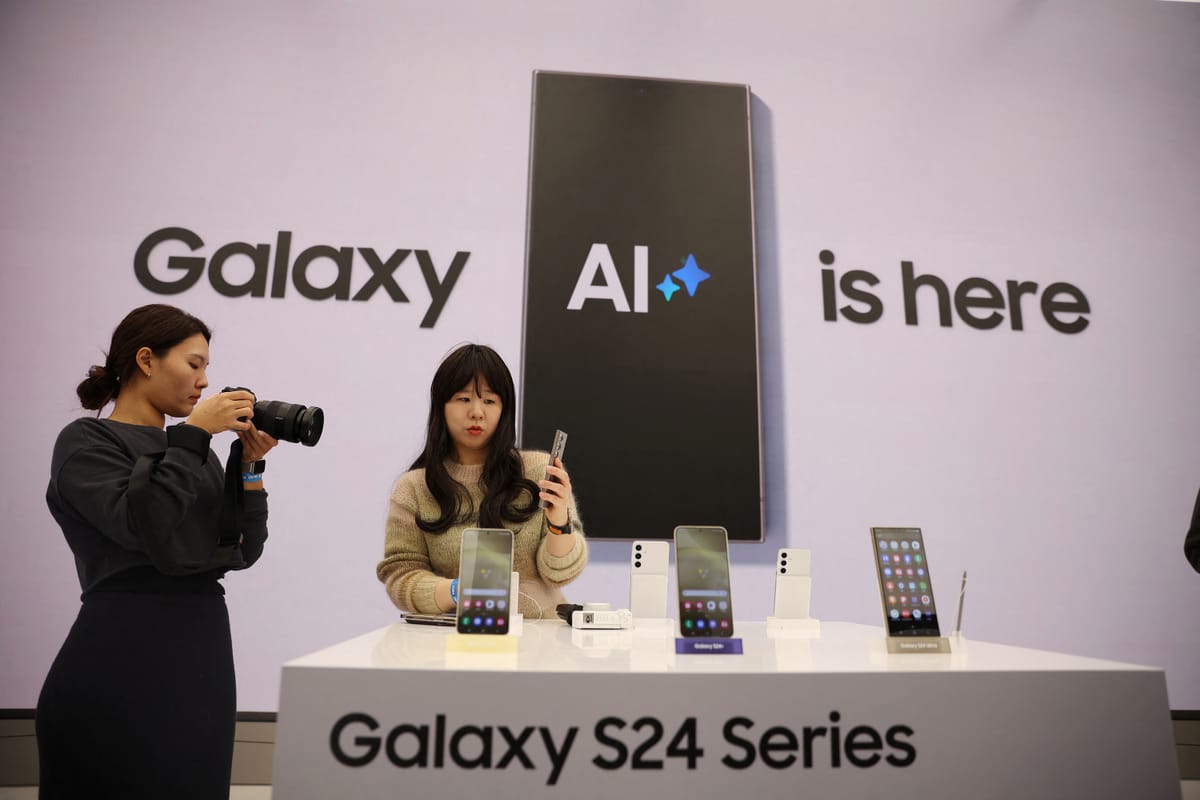Apple recently topped Samsung in the smartphone market, but a new Galaxy lineup is aiming for a comeback
Samsung is revamping its phone lineup, leveraging the rise of artificial intelligence (AI) to get back on top of the market.

A few minutes every morning is all you need.
Stay up to date on the world's Headlines and Human Stories. It's fun, it's factual, it's fluff-free.
The backstory: Samsung, South Korea’s largest company, has been at the top of the smartphone game for more than a decade. But the market has been seeing headwinds from slumping demand, global inflation and economic uncertainty. Plus, geopolitical tensions centered on essential chip technology have loomed over the tech industry. But, after seven quarters in a row of decline, some data is suggesting that 2024 might mark the smartphone sector’s recovery. According to Canalys’ latest research, smartphone shipments around the world grew 8% year on year in the fourth quarter last year to around 320 million units.
More recently: Apple officially beat Samsung last year to become the top-selling smartphone brand in the world – the first time Samsung’s been ousted from the top spot since 2010. The iPhone snagged a fifth of the global market, according to estimates from research firm IDC. Although Apple tends to dominate sales during the holidays, beating Samsung across the whole year is unprecedented. It’s especially notable considering Apple has faced challenges and increased competition from local manufacturers like Huawei in China, which is its largest market. Earlier this week, we reported that Apple was offering discounts on its iPhone range in China to boost sales. But, according to Jeffries, Apple will likely continue to see a decline in sales in China this year.
The development: Samsung is revamping its phone lineup, leveraging the rise of artificial intelligence (AI) to get back on top of the market. At its Unpacked conference on Wednesday in California, the company debuted the Galaxy S24, S24+ and S24 Ultra phones – and all of them are incorporating AI in a way that hasn’t been done with other phones yet.
With AI tools based on Google’s Gemini technology, these phones can do some pretty nifty things like live-translating phone calls, transcription, summarizing articles from the web and even filling in parts of photos with generative AI. Aside from the AI perks, the phones are slimmer and brighter, and some of the models have larger screens.
This gives Samsung a head start on Apple, which isn’t expected to reveal its plans for AI until June, and new iPhones aren’t expected until September. Samsung’s new lineup is already available for presale, with the new Galaxy phones coming out on January 31. This new lineup also helps Google in its competition with Microsoft and OpenAI by exposing more users to its own AI tech.
Key comments:
“While we saw some strong growth from low-end Android players like Transsion and Xiaomi in the second half of 2023, stemming from rapid growth in emerging markets, the biggest winner is clearly Apple,” IDC research director Nabila Popal said. “All this despite facing increased regulatory challenges and renewed competition from Huawei in China, its largest market. Apple’s ongoing success and resilience is in large part due to the increasing trend of premium devices, which now represent over 20% of the market.”
“The top two players are eagerly looking for new growth drivers for their smartphone businesses as both suffered market share declines in Q4,” said Canalys Research Manager Amber Liu. “In 2023, Samsung focused on the mid-to-high-end segment for profitability but lost share in the low-end segment and also its leading position in the global market. Its 2024 product launches, especially in the high-end segment with a focus on on-device AI, will support its rebound as an innovation leader in 2024.”
“This is a validation of the quality of our models,” said Thomas Kurian, head of Google’s cloud computing unit, about Samsung's choice to use Gemini technology. “They were free to choose whoever they wanted.”




Comments ()